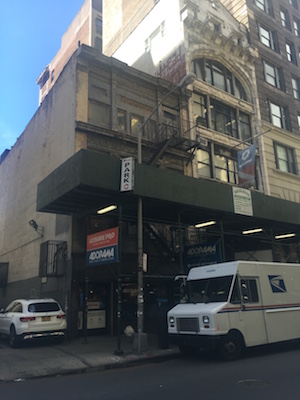
BY ALEX ELLEFSON | Borough President Gale Brewer has dug up an obscure and rarely used provision of the City Charter to fight for affordable housing in a controversial Chelsea development.
The borough president invoked the “triple no” rule, used only 21 times since 1995, to challenge a City Planning Commission (CPC) decision to exempt a development project at 42 W. 18th St. (btw. Fifth & Sixth Aves.) from the new Mandatory Inclusionary Housing (MIH) program. The move will force a City Council vote on whether to override the commission.
On Mon., Aug. 18, the commission approved Acuity Capital Partners’ special permit application to build beyond existing zoning regulations for the proposed 62-unit, 17-story condo building. However, Brewer argues new housing policy requires the developer make 20–30% of the units affordable in order to receive the permit.
“One of the Mandatory Inclusionary Housing program’s biggest selling points was creating affordable housing wherever the city gives out special permits that allow more residential development,” Brewer said in a statement. “This project doesn’t include the affordable housing the law requires, and the arguments that it should be exempt are simply wrong.”
However, because the development uses air rights from two adjacent landmarked buildings, one of which houses the well-known Adorama camera store, the CPC determined the permit does not increase the maximum permitted floor area of the site — an important sticking point in triggering MIH.
Brewer argues the Commission was too lax in its interpretation of the new policy. Because the permit allows the developer to create 20 units more than allowed by zoning regulations, she said the new affordable housing policy should apply.
In an Aug. 10 Daily News op-ed, published ahead of the CPC vote, Brewer pointed out MIH rules “clearly state they must apply ‘where a special permit application would allow a significant increase in residential floor area.’ ” Brewer also noted the Chelsea development is the first application of its kind since the new policy took effect, and loosening the interpretation of the law “would set a dangerous precedent, undermining the creation of affordable housing in neighborhoods throughout Manhattan.”
Future affordable housing protocol also appears to be a strong motivating factor in the CPC’s decision to exempt the development from MIH. On Aug. 15, The New York Times reported the Mayor’s Office, which worked aggressively to pass the affordable housing plan, is worried excessive enforcement could prompt court challenges to the program.
A Department of City Planning spokesperson said in a statement that the goal is to enforce MIH wherever possible, but to do so “consistently and lawfully,” also noting, “To do otherwise, would seriously jeopardize the thousands of affordable apartments this legislation will yield for New Yorkers.”
The borough president’s perspective on MIH is supported by Community Board 5 (CB5), which passed a resolution in May recommending the special permit be denied unless the new affordable housing rules are applied.
“The words in the legislation passed by the council make it clear MIH applies in this case,” said CB5 District Manager Wally Rubin. “We applaud the borough president for sending this to the City Council.”
The final call will have to be made by the City Council. “Triple no” can be invoked when both the community board and borough president object to a land use application that is approved by the CPC.
































